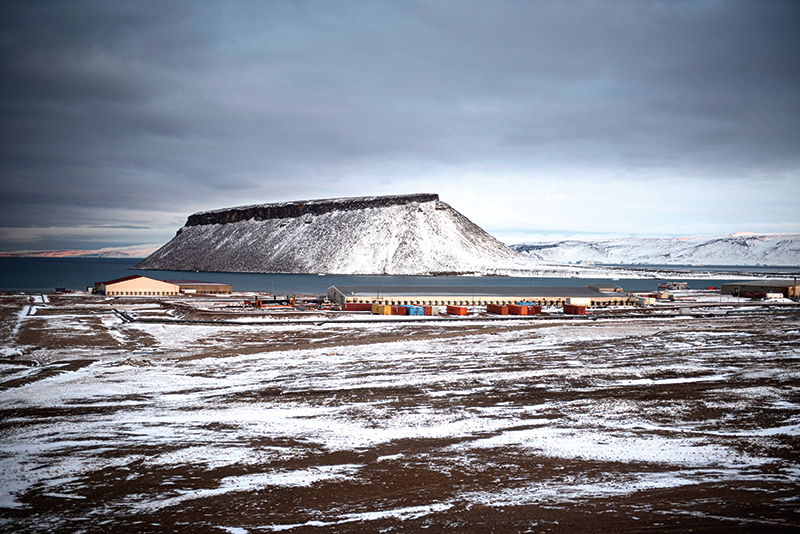Amerykańska administracja zauważalnie intensyfikuje starania na rzecz zagwarantowania sobie wpływów w odniesieniu do położonej w Arktyce Grenlandii. Wyspa ta tradycyjnie pozostaje na radarze światowych mediów już od wielu lat, jednak jej strategiczne znaczenie dodatkowo dziś rośnie, m.in. za sprawą przyśpieszających zmian klimatu. Co zatem w szczególności stanowi o tym, że Grenlandia to dziś tak istotny obszar na geopolitycznej mapie świata?
Na przełomie sierpnia i września światowe media szeroko relacjonowały nieudaną próbę Donalda Trumpa, by odkupić od Danii Grenlandię – tę samą, za którą ponad 70 lat wcześniej administracja Harry’ego Trumana oferowała równowartość 100 milionów dolarów w złocie. Do transakcji nie doszło, jednak już w kolejnych miesiącach donoszono o tym, że sekretarz stanu Mike Pompeo rozmawia z duńskim ministrem spraw zagranicznych o inwestycjach na wyspie oraz czyni starania w celu otwarcia tam w 2020 roku konsulatu USA. Amerykańskie wysiłki na rzecz zwiększenia swoich wpływów na Grenlandii wynikają z wielu powodów: wszystkie sprowadzają się jednak do tego, że terytorium posiada ogromne znaczenie geostrategiczne, dając możliwość odpowiedzi chociażby na coraz śmielsze działania Chin w regionie.
Strategiczne położenie
Grenlandia sama w sobie jest w znakomitej większości skuta lodem. Znaczenie obszaru zawiera się jednak nie w rozwiniętej tam infrastrukturze, czy lokalnym przemyśle (Duńczycy rokrocznie subsydiują funkcjonowanie Grenlandii, pokrywając ok. 60% jej budżetu), ale w samym położeniu wyspy. Relatywna bliskość Grenlandii względem Ameryki Północnej, jak i Europy sprawiła, że od początku była ona wykorzystywana dla potrzeb strategii obronnej NATO. Dość zresztą powiedzieć, że jeszcze od 1943 r. w grenlandzkim Thule stacjonują amerykańscy żołnierze – jest to najbardziej wysunięta na północ jednostka wojskowa Stanów Zjednoczonych – zaś w czasie Zimnej Wojny Amerykanie próbowali też stworzyć nieopodal ściśle tajną bazę nuklearną (tzw. Project Iceworm).
Korzyści wynikających z położenia Grenlandii jest przy tym oczywiście więcej i wykraczają one poza sferę stricte militarną. Znaczenie geostrategiczne szeroko rozumianej Arktyki rośnie bowiem dodatkowo za sprawą postępujących zmian klimatycznych i związanego z tym „otwierania się” regionu na działalność człowieka. Ten zaś, kto kontroluje Grenlandię, posiada prawo do formułowania własnych roszczeń do rozszerzenia wyłącznej strefy ekonomicznej (WSE) o biegun północny i dalszą część Arktyki. Co więcej, w obliczu topnienia pokrywy lodowej wyspa może być wymarzonym centrum przeładunkowym dla spodziewanego w przeszłości frachtu towarowego arktycznymi szlakami morskimi.
Potencjał surowcowy
Drugim podstawowym powodem, dla którego o wpływy na Grenlandii zabiegają największe światowe mocarstwa, są szeroko rozumiane surowce naturalne. Na wyspie znajduje się między innymi złoto, diamenty, uran, żelazo, cynk, ropa naftowa i gaz ziemny, ale także nawet ćwierć światowych zasobów tzw. metali ziem rzadkich (REE), kluczowych dla rozwoju zaawansowanych technologii. Co przy tym szczególnie istotne, ów potencjał surowcowy wyspy wciąż jeszcze pozostaje w dużej mierze niezagospodarowany, choć stopniowo się to zmienia (Grenlandczycy uzyskali możliwość samodzielnego zarządzania lokalnymi zasobami dopiero w 2009 roku). Prawdopodobnie trend ten dodatkowo intensyfikować będzie także postępujące topnienie pokrywy lodowej, mogące np. zwiększać rentowność ewentualnego wydobycia ropy i gazu u wybrzeży Grenlandii.
Szczególnym zainteresowaniem mediów cieszą się tradycyjnie zwłaszcza informacje dotyczące wydobycia na Grenlandii wspomnianych już metali ziem rzadkich. Obecnie REE są wydobywane i rafinowane w większości w Chinach (w przeszłości potentatem były także Stany Zjednoczone, jednak zaprzestały produkcji w latach dziewięćdziesiątych ubiegłego wieku) i to właśnie Chińczycy są dziś już także mocno zaangażowani w tym względzie na Grenlandii. W szczególności rzecz dotyczy często przywoływanego projektu Kvanefjeld (m.in. złoża uranu, ale również największe na świecie niezagospodarowane złoża REE), z którego to chińska firma Shenghe, będąc istotnym akcjonariuszem i strategicznym partnerem inwestycji, ma odbierać całość produkowanych metali ziem rzadkich.
Niepewna przyszłość?
W kontekście ukazanego znaczenia Grenlandii kluczowym pytaniem pozostaje to, czy wyspa pozostanie w przyszłości terytorium zależnym Królestwa Danii. W ramach grenlandzkiej polityki silnie obecny jest bowiem nurt separatystyczny, a za niepodległością wyspy otwarcie opowiadają się najważniejsze grenlandzkie partie polityczne. Co więcej, zgodnie z badaniami opinii publicznej, aż 67,8% mieszkańców Grenlandii chciałoby oderwać się od Danii na przestrzeni najbliższych dwóch dekad.
Na mocy porozumienia z 2009 r., Grenlandia ma prawo samodzielnie zadecydować o swojej niepodległości, choć pod warunkiem, że będzie ona wówczas w stanie samodzielnie funkcjonować. I choć dziś nie ma o tym raczej mowy (patrz wspomniane wcześniej uzależnienie od duńskich subsydiów), to sytuacja ta może zmienić się w przyszłości, gdy tylko dodatkowo zwiększy się wydobycie surowców naturalnych oraz upowszechni się tranzyt towarów przez Arktykę. Wówczas zaś, jeżeli powstałoby niepodległe państwo grenlandzkie, rozpocznie się zupełnie nowa odsłona geopolitycznej rozgrywki o zapewnienie sobie jak największych wpływów.
Mateusz Kubiak

absolwent Studiów Wschodnich i Stosunków Międzynarodowych na Uniwersytecie Warszawskim. Pracuje jako analityk sektora energetycznego, zajmuje się również zawodowo regionem Kaukazu i Azji Centralnej.
[spacer color=”8BC234″ icon=”Select a Icon” style=”1″]
The Warsaw Institute Foundation to pierwszy polski geopolityczny think tank w Stanach Zjednoczonych. Strategicznym celem tej organizacji jest wzmocnienie polskich interesów w USA przy jednoczesnym wspieraniu unikalnego sojuszu między dwoma narodami. Jej działalność koncentruje się na takich zagadnieniach jak geopolityka, porządek międzynarodowy, polityka historyczna, energetyka i bezpieczeństwo militarne. The Warsaw Institute Foundation została założona w 2018 roku i jest niezależną organizacją non-profit, inspirowaną bliźniaczą organizacją działającą w Polsce – Warsaw Institute.
The Warsaw Institute Foundation is Poland’s first geopolitical think tank in the United States. The strategic goal of this organisation is to bolster Polish interests in the U.S. while supporting the unique alliance between the two nations. Its activity focuses on such issues as geopolitics, international order, historical policy, energy, and military security. Established in 2018, The Warsaw Institute Foundation is an independent, non-profit organization inspired the twin Poland-based Warsaw Institute.
[spacer color=”8BC234″ icon=”Select a Icon” style=”1″]
Greenland: The Arctic Treasure of Denmark
The U.S. administration is noticeably intensifying its efforts to secure influence in Greenland, located in the Arctic. Although the island has been on the radar of the world’s media for many years, its strategic importance is growing even more so today due to, for example, accelerating climate change. So what in particular makes Greenland such an important area on the geopolitical map of the world today?
In late August and early September, the world’s media widely commented on Donald Trump’s failed attempt to buy Greenland from Denmark – the same island for which the Harry Truman administration had offered to pay the equivalent of $100 million in gold over 70 years earlier. Despite the failed transaction, in the following months, it was reported that U.S. Secretary of State Mike Pompeo was holding talks with the Danish Minister of Foreign Affairs on potential investments on the island and was making efforts to establish a U.S. consulate there in 2020. There are many reasons why the Americans are interested in increasing their influence in Greenland. All, however, come down to the fact that the territory is of great geostrategic importance, providing the opportunity to, for example, respond to China’s ever bolder activities in the region.
Strategic location
Greenland itself is largely covered with ice. Nevertheless, the importance of the region lies not in the developed infrastructure or local industry (every year the Danes subside the functioning of Greenland by covering about 60% of its budget), but in the very location of the island. Since the beginning, Greenland’s relative proximity to both North America and Europe has caused the island to be used for the purposes of NATO’s defence strategy. Suffice it to mention that since 1943 U.S. troops have been stationed in the Greenlandic town of Thule – the northernmost military base of the United States – and during the Cold War the Americans also attempted to build a top-secret nuclear base nearby (the so-called “Project Iceworm”).
Of course, there are many more benefits connected with Greenland’s location that go beyond the strictly military sphere. In general, the geostrategic importance of the Arctic (in the broad sense of the term) is gradually being increased due to progressing climate change and the related “opening-up” of the region to human activity. One who controls Greenland has the right to formulate their own claims to extend the exclusive economic zone (EEZ) to the North Pole and the rest of the Arctic. Moreover, in the face of the melting of the Greenland ice sheet, the island may soon become a perfect transhipment centre for the long-expected transport of goods through the Arctic shipping routes.
Raw material potential
The second major reason why Greenland has recently become a place where the world’s great powers seek to establish their influence is broadly understood natural resources. The island is rich in, among others, gold, diamonds, uranium, iron, zinc, crude oil and natural gas. Moreover, there is even a quarter of the world’s reserves of the so-called “rare earth elements” (REEs), which are crucial for the development of advanced technologies. What is particularly important is the fact that the island’s raw material potential remains largely undeveloped, though this is gradually changing (Greenlanders have not been granted the right to self-govern local mineral resources until 2009). It is highly probable that the tendency will be further intensified by the ever-progressing melting of the ice cap, which may, for example, increase the profitability of potential oil and gas extraction off the coasts of Greenland.
As usual, the media are particularly interested in the latest information on the extraction of the aforementioned rare earth elements in Greenland. Nowadays, REEs are mostly mined and refined in China (in the past, the United States was also a leading REE producer, however, the country ceased production in the 1990s), and it is the Chinese who are already heavily involved in this sector in Greenland. In particular, this concerns the frequently discussed Kvanefjeld project (the extraction of substantial uranium deposits as well as the world’s largest undeveloped REE deposits), which provides the Chinese company Shenghe, a major shareholder and strategic investment partner, with the licence to acquire all rare earth elements produced.
Uncertain future?
In the context of the demonstrated importance of Greenland, the key question is whether the island will remain a dependent territory of the Kingdom of Denmark in the future. Today, the separatist movement is strongly present in Greenland’s politics, causing the most important Greenlandic political parties to openly advocate for the island’s independence. Moreover, according to public opinion polls, up to 67.8% of Greenlanders would like to break away from Denmark over the next two decades.
Under the 2009 agreement, Greenland has the right to decide on its independence provided that it is, of course, able to self-function. Although today this is rather impossible (see the aforementioned dependence on Danish subsidies), the situation may change in the future once the extraction of natural resources is further increased and the transit of goods through the Arctic becomes more widespread. If one day an independent state of Greenland is indeed established, then an entirely new phase in the on-going geopolitical game aimed at securing the greatest possible influence in Greenland will surely begin.
Mateusz Kubiak
Na zdjęciu: Amerykańska baza lotnicza Thule na Grenlandii fot. Ida Guldbaek Arentsen/EPA-EFE/Shutterstock




















































